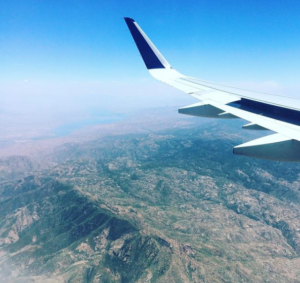 I love to travel, but I am a nervous flyer.
I love to travel, but I am a nervous flyer.
While I’m not an engineer, or a math person, or even a science person, the principles of flight make sense to the logical part of my brain. It’s the primal part that can’t fathom the act.
When I was a toddler there was a terrible plane crash at O’Hare. All 271 people onboard were killed, as well as a few people on the ground. Not counting acts of terrorism, this was the worst passenger plane disaster on U.S. soil.
My father worked near the crash site. I heard the story of this plane’s demise many times throughout my childhood and, in some way, I feel it has influenced my lifelong fear of flying.
Never mind the fear, I have to fly.
When I returned from Chicago this summer, I had a short layover in Detroit. The flight boarded early, and I found myself seated in an exit row next to a well-dressed woman, probably in her early 70s. She smelled good, her eyes were warm, and I felt like an utter slob in my camo sweatpants, slip on shoes and Bob Seger T-shirt.
“From Detroit?” she asks. Given my appearance this could very well be taken as a slight toward Motor City.
“No,” I tell her. “Chicago, originally. But I live in Arizona now, so I’m heading to Phoenix.”
“Flying east?”
“It was a cheap flight,” I say with a shrug.
When I ask her where she is from she says, “Florida.”
Tan, sun-bleached hair. Definitely Floridian.
She removes the cards from the seatback to read about the aircraft.
“Ugh, this is an old airplane.”
I think of La Bamba, of Buddy Holly. Inwardly, I tell myself to shut up—“The weather isn’t bad, and you aren’t a rock star.”
“A really, really old plane,” The Floridian continues, shaking her head.
I look at my phone. If we take off in the next 10 minutes, I’ll have 60 minutes, exactly, to make my connection to Phoenix.
The Floridian kicks at the carry-on tucked under the seat in front of her. “If worse comes to worst, I have a birthday cake in my bag. We can share it.”
I didn’t know if the “worst” she referred to was being stuck on the tarmac or our untimely demise. I imagined myself eating fistfuls of cake as the “really, really old plane” plummeted into the suburbs of Chicago.
When the plane finally aligns itself on the runway, I have exactly 45 minutes to make my connection.
The Floridian is quiet during takeoff.
Once we’re airborne, she leans over my lap to look out the window and says, “I wonder why we’re flying south. Why are we over Indiana?”
My heart pounds.
“Are we?”
“Well, yeah,” she says. “We should be over the lake by now, but look—”
I refuse to look, grit my teeth and say, “I have a very short connection in Detroit.”
I believe that articulating concern over my connection will prevent us from crashing in a cornfield in Indiana; I would rather die anywhere than Indiana.
Suddenly distracted by her own observation that the plane is flying in the wrong direction, The Floridian asks what time my flight leaves for Phoenix.
“11:30,” I tell her, still refusing to look out the window.
She scoffs and says, “That’s ridiculous. We should have landed an hour ago…”
Then without my permission, outraged on my behalf, she summons a flight attendant.
“This young lady needs to make an 11:30 flight all the way to Phoenix. Is she going to make it?”
And though I love that she calls me a “young lady,” I am fiercely embarrassed. I’m the kind of person who will eat a hamburger even if I ordered sushi. I’m not pushy. I’m not fond of making a scene. I sink a little in my seat.
The flight attendant admits she can’t guarantee that I’ll make my flight and makes eye contact with me to advise, “But when we do land, take the tram to your gate. Don’t stop for a bathroom break.”
I nod and thank the flight attendant repeatedly for information I’d already intuited on my own. When she walks away, The Floridian squeezes my hand conspiratorially.
“When we land, I’m going to jump out of the way, and you’re going to make a break for it.”
I nod. I don’t believe I’m going to make my flight to Phoenix, and that’s okay. I’m already envisioning ways to while away the hours at Detroit Metro.
When the wheels hit the runway, The Floridian does the sign of the cross. I’ve only seen people do this on a plane once before after a brief, bumpy flight from Shannon, Ireland, to Coventry, England; most of those people were carrying gallon jugs of holy water they’d purchased in Shannon.
When the plane lumbers to the gate, The Floridian squeezes my arm. “Run like hell.”
As promised, she hurries out of my way.
I’m the fifth person off the plane.
The tram at Detroit Metro is out of order, so I run 50 gates, finally realizing the full potential of those moving walkways.
I’m the last person on board the flight to Phoenix, and arrive at my destination five hours before my luggage.
That night, as I drift to sleep in my own bed beside my wife, I can’t stop thinking of The Floridian. She reminded me forcibly of someone. Who? I cycle through names and faces—no, no, no. And then it dawns on me that she was an amalgamation of nurses who held my hand, strangers who pushed my car out of the snow, that one landlord who cut the rent when my dog was sick, my first boss who, despite my inexperience, hired me saying, “I believe women rise to the expectations set before them.” She reminded me of every person I’ve ever encountered who decided to be kind, to help out, to clear a path not out of obligation or convenience or for reciprocity.
In one of my favorite plays, Angels in America, there’s a meta-moment where a deathly ill character, Prior, quotes A Streetcar Named Desire, telling his no-nonsense stranger-come-savior, Hannah, “I have always depended on the kindness of strangers.” To which Hannah humorlessly replies, “Well, that’s a stupid thing to do.”
And while I by no means “depend on the kindness of strangers,” I do wish kindness as strangers was our default setting—to hold the hand, to cut the rent, to make room for just one person to “run like hell”—not because we have to, but because we can.

